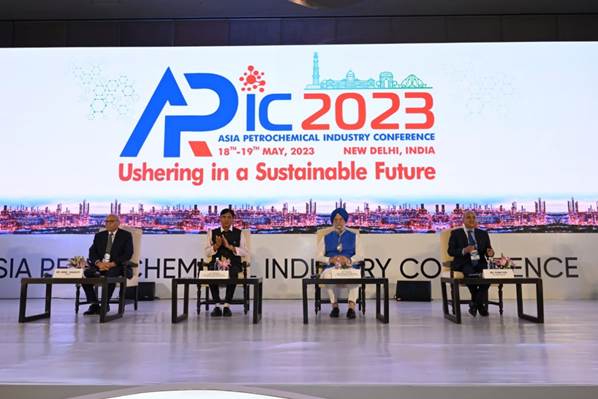
“25% of the global energy demand growth in the next two decades is going to emanate out of India”, said the Union Minister of Petroleum & Natural Gas and Housing & Urban Affairs Shri Hardeep Singh Puri, while talking on the theme, ‘Ushering in a Sustainable Future’ at the Asian Petrochemical Industry Conference, at New Delhi, today.
Dr. Mansukh Mandaviya, Minister for Health and Family Welfare and Minister for Chemicals & Fertilizers graced the occasion as the other speaker at the coveted Ministerial Panel of the two day International Petrochemical Industry Conference. Shri Pankaj Jain, Secretary (MoP&NG) apart from other senior functionaries from the Government, organizing members of CPMA, members from APIC partner countries – Japan, Korea, Malaysia, Singapore Taiwan and Thailand were part of the august gathering.
Talking on energy availability, affordability and security for all, the Petroleum Minister said, “The market size of the Indian Chemicals and Petrochemicals sector is currently USD 190 Billion. This sector supports the Hon’ble Prime Minister’s initiative of Make in India and Make for the World, as it can transform India into a global manufacturing hub”. “India is not only the sixth largest chemicals producer in the World and the fourth in Asia but also exports Chemicals to more than 175 countries. It accounts for 13% of India’s total exports”, added Shri Puri.

(Union Minister of Petroleum & Natural Gas and Housing & Urban Affairs Shri Hardeep Singh Puri along with other dignitaries at APIC -2023)
Talking about the growth of Petrochemical Sector in India, the Petroleum Minister said that it is governed by several factors, the most important of these is the increasing demand for petrochemical products from a growing population and a rapidly expanding economy. “The India petrochemical industry has come a long way from inception in the 1970s and is poised for transformational growth. It is expected to contribute almost 10% to the incremental growth in the global petrochemical demand in the coming years”, added Shri Hardeep Singh Puri.
Sharing some staggering facts, Shri Puri said, “Indian chemical sector continues to grow at a rate of 1.2-1.5 times the GDP. Going forward, as the chemical market in India grows to USD 300 billion from the current valuation of USD 178 billion, we are expecting the coming decade to bring in investments worth more than USD 87 billion. India is expected to account for more than 10% of the world’s growth in petrochemicals”.
Highlighting the ease of doing business policies of Government of India, Shri Hardeep Singh Puri said, “The Government has instituted several policies to boost this sector including 100% FDI through automatic routes, PCPIR (Petroleum, Chemicals and Petrochemicals Investment Region) zones and set up of infrastructure such as 10+ plastic parks”. Informing about the proposed new PCPIR policy, the Minister said that it would be implemented between 2020–35 and is expected to attract an approximate combined investment of over INR 34 lakh crores (USD 420 billion) for the sector.
Speaking on the promising investment opportunities in the Petrochemical Sector, the Petroleum Minister said that there are potential investment opportunities of USD 30 Billion in the decade to come and the Government of India is proactively addressing the present challenges and implementing several flagship initiatives to improve the overall competitiveness, quality and output of the industry. “The Chemicals & Petrochemicals demand in India is expected to nearly triple and reach USD 1 trillion by 2040”, shared Shri Puri.
In his concluding remarks the Petroleum Minister said, “About 80% of India’s petrochemicals capacity is integrated with petroleum refineries. This gives India an edge in terms of petrochemical feedstock certainty. We have increased India’s refining capacity from 215 MMTPA in 2013-14 to 251.2 MMTPA – the fourth largest in the world after the United States, China and Russia”.
***
RKJ



